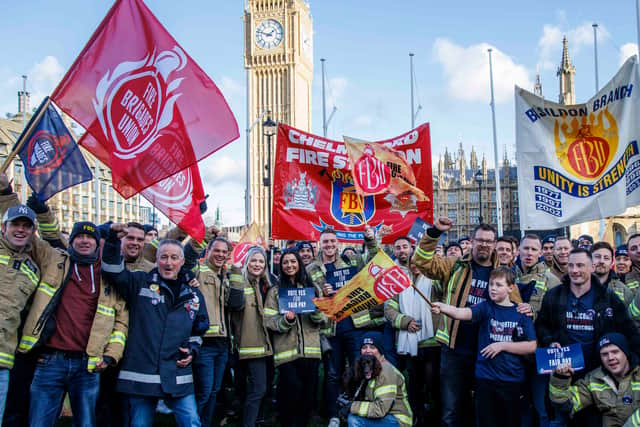Firefighter strike: Fire Brigades Union to strike for first time since 2003 - everything you need to know
and live on Freeview channel 276
Following a ballot from members, the FBU has delivered a significant mandate for strike action. The vote moves the union towards becoming the latest to take industrial action in 2023.
The ballot for members opened on December 5 and closed on January 30. There was a turnout of 73% from members and 88% voted in favour of strike action. The vote to go on strike comes after FBU members rejected a below inflation five per cent pay increase offer in November 2022.
Advertisement
Hide AdAdvertisement
Hide AdNo strike days have been announced yet by the union, but they have warned that if employers don’t make an improved offer, the FBU will announce a series of dates in the coming weeks.
If the strike was to go ahead, it would be the first nationwide strike by firefighters since 2003. The union has said that employers and the government have “the ball in their court”.
Matt Wrack, general secretary of the FBU, said: “Firefighters across the UK have spoken. The Fire Brigades Union has a decisive mandate for strike action.
“This is an overwhelming vote for strike action against an offer which would mean further significant cuts to real terms wages for firefighters and control room staff. They have already lost at least 12% of the value of their pay since 2010.
Advertisement
Hide AdAdvertisement
Hide Ad“This is an absolute last resort for our members. The responsibility for any disruption to services lies squarely with fire service employers and government ministers.
“Rishi Sunak’s government has refused to make funding available for a decent pay offer to firefighters and control staff.”
He added: “Firefighters were among Britain’s Covid heroes who kept frontline services going during the pandemic. The Prime Minister has badly misjudged the public mood by imposing pay cuts on key workers.
“Our members risk their health and safety, and sometimes their lives, round the clock to keep people safe and serve their communities. However, with inflation and energy bills rocketing, they are now increasingly struggling to pay the bills or to afford the basics.
Advertisement
Hide AdAdvertisement
Hide Ad“The government and the employers have the power to stop strikes from happening by making a credible offer that can resolve this dispute. The ball is in their court.


“We have delayed calling strikes to allow the employers to meet us and to make a new offer. I hope they take that opportunity. Otherwise, in the coming weeks, we intend to announce a series of strike dates and industrial action."
Comment Guidelines
National World encourages reader discussion on our stories. User feedback, insights and back-and-forth exchanges add a rich layer of context to reporting. Please review our Community Guidelines before commenting.
